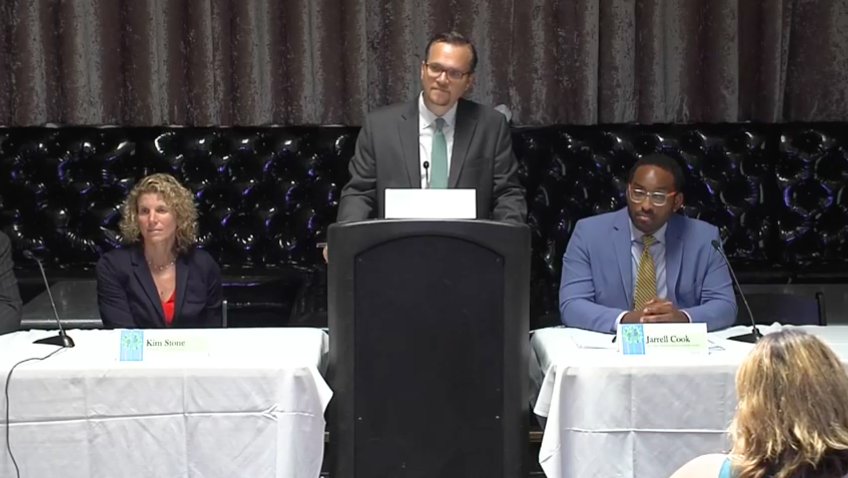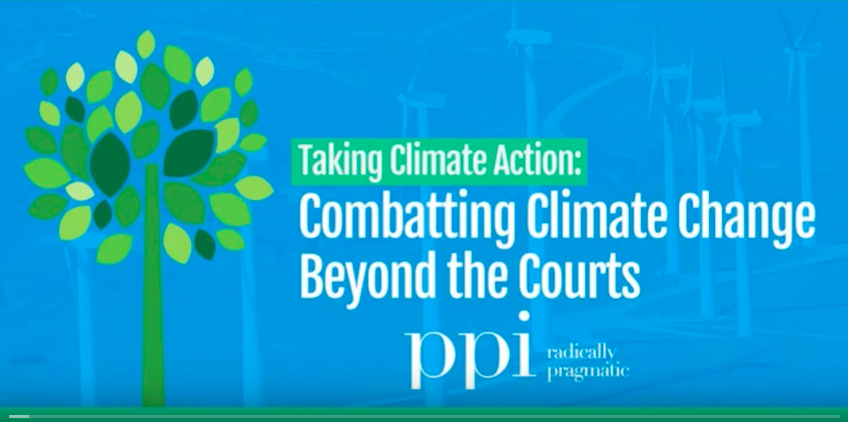As part of a growing trend of lawsuits over climate change impacts, cities and states across the U.S. are seeking damages from oil, gas, and coal companies whose products drive the crisis and which for years evidently engaged in disinformation and denial campaigns to stall climate action.
Now the fossil fuel industry is pushing back, taking a page out of Big Tobacco’s playbook to rein in that liability litigation, and getting help from an unexpected source.
Behind the scenes, politically affiliated groups are quietly providing support. One of the outfits promoting the efforts to counter the slew of climate lawsuits is none other than the Progressive Policy Institute (PPI), a center-left Washington, D.C.-based think tank with links to the Democratic party.
PPI’s Former Coal Lobbyist
Phil Goldberg, PPI’s director of its Center for Civil Justice, is leading the charge.
For over a year, PPI’s website has been showcasing Goldberg’s work attacking climate litigation, which he calls “copycat climate suits.” Goldberg is a former lobbyist for coal giant Peabody Energy, which his law firm still represents.
And while Goldberg’s bio on PPI’s website lists him as a partner in the corporate law firm Shook, Hardy & Bacon, there’s no mention of his hiring earlier this year by the National Association of Manufacturers (NAM) to serve as special counsel in its fight against climate litigation. NAM’s Manufacturers’ Accountability Project, which it launched in 2017, targets climate lawsuits against the manufacturing industry’s energy sector.
A great panel at today’s @ppi “Combating Climate Change Beyond the Courts” event in Sacramento, California including Jarrell Cook of @cmta, @Lenny_Mendonca, and others! pic.twitter.com/Aypxnhz7X5
— MFG Accountability (@MFGProject) June 3, 2019
NAM’s members, many of which are facing litigation, include such fossil fuel powerhouses as ExxonMobil, ConocoPhillips, Koch Industries, Phillips 66, Southern Company, Continental Resources, Marathon Petroleum, Dominion, Energy Transfer, and Devon Energy.
The states of New York and Massachusetts, as well as the U.S. Virgin Islands, have taken legal action against ExxonMobil, while a number of cities and counties across the country have filed a lawsuit against over thirty companies, including other NAM members ConocoPhillips, Phillips 66, Marathon Oil, and Devon Energy.
PPI’s website also does not disclose Goldberg’s recent work for Grow America’s Infrastructure Now (GAIN), a front group funded by several oil and gas trade associations. In a report for GAIN titled “Vigilante Regulation,” Goldberg, along with two other Shook, Hardy & Bacon attorneys, detail how tort law can be employed to stem what the authors call “anti-pipeline activism.”
“It’s just plain freaky that a hired gun for the fossil fuel industry would pretend to be neutral or, shockingly, even perhaps ‘progressive’ under the guise of PPI, which has a good reputation as a think tank,” said Denise Antolini, an associate dean at the University of Hawai’i-Manoa’s School of Law. “I guess the ‘tank’ is stronger than the ‘think’ with PPI’s embrace of Mr. Goldberg’s advocacy for big oil.”
Antolini, an expert in environmental law who supports climate litigation, recently found herself in a row with Goldberg, who last month emailed the academic with what she described as a “surprising” request she’s never received in her 23-year career. Goldberg asked Antolini to postpone a panel discussion in a conference on climate litigation she was scheduled to host and moderate that same day at the University of Hawai’i. His reasoning? The lack of opposing voices to climate litigation on the panel.
Phil Goldberg moderating a June 3, 2019 PPI panel discussion on “Combatting Climate Change Beyond the Courts”
Then, after the pair sparred in two op-eds published in the Hawaiian press, Antolini, in a formal letter to Goldberg, rebuffed the lawyer’s request, which she called an attempt to “disrupt a public event.”
Criticizing Goldberg’s characterization of climate litigation as “controversial,” Antolini wrote: “It’s understandable that your client would take this position but that does not mean the lawsuits, brought by governments on behalf of injured communities, are ‘controversial.’”
ALEC, Big Tobacco, and Asbestos
Shook, Hardy & Bacon has a long history of working for industries that have been subject to controversy.
Goldberg previously served as an adviser to the Civil Justice Task Force of the “corporate bill mill,” the American Legislative Exchange Council (ALEC), where he published reports against state-led climate lawsuits in the group’s publication Inside ALEC.
ALEC, which works secretively with legislators to produce model legislation on behalf of its corporate sponsors, has a history of climate change denial and funding from fossil fuel interests and the Koch brothers’ foundations.
Goldberg’s colleague at Shook, Hardy & Bacon, attorney Mark Behrens, currently chairs ALEC’s Civil Justice Task Force. Another lawyer at the firm, Victor Schwartz, previously chaired the task force and is currently a member of ALEC’s board of scholars.
After going to bat for decades for Big Tobacco, Shook, Hardy & Bacon is now a leading defender of the asbestos industry, whose product causes a type of cancer known as mesothelioma.
Goldberg did not respond to several requests for comment.
PPI’s Fossil Fuel Backing
Growing out of the now-defunct Democratic Leadership Council (DLC), PPI is one facet in the Democratic Party wing that promotes “Third Way” free market, corporate-friendly policies to balance the party’s more leftist tendencies. Former President Bill Clinton previously chaired the DLC.
PPI’s website, which greets its visitors with the banner “radically pragmatic,” does not publicize its funding sources. But the group’s funding seems to come at least in part through its parent organization, the Third Way Foundation, whose tax forms states it is “doing business as the Progressive Policy Institute.”
The Progressive Policy Institute hosted a June 3, 2019 event moderated by Phil Goldberg on “Combatting Climate Change Beyond the Courts.”
In 2015 the Third Way Foundation received funding from the American Gas Association. The group receives other corporate funds, including from the pharmaceutical industry.
Evidently, oil and gas companies have for years donated to nonprofit institutions to further their own interests.
As DeSmog contributor Sharon Kelly recently revealed in an investigation for The Guardian, oil giant Mobil used its charitable giving to promote its interests through a range of universities, civic groups, and arts programs. She reported that a top Mobil official said: “I don’t know whether corporate philanthropy as I’ve sort of defined it, which is just to get a warm feeling, ever existed. But if it did, I’d have to say that it’s a dying concept in terms of corporate giving.” That was during a talk in 1987.
Third Way’s funding might, at least in part, explain why PPI supports fracking and the boom in building natural gas pipelines and other infrastructure.
A PPI spokesperson did not respond to multiple requests for comment on this story.
Industry Has Reason to Fear Climate Lawsuits
PPI and others’ pushback against climate litigation will only intensify, predicts Robert Brulle, a sociology professor at Drexel University, who studies environmental movements and climate science disinformation campaigns.
“As these cases move toward discovery and eventual trial, the architects of the campaign to obstruct climate action, such as the National Association of Manufacturers, are gearing up for a long battle in the courts,” he said.
Brulle, who, along with other academics, filed a brief detailing what major fossil fuel companies knew historically about climate change as part of the ongoing litigation, thinks the industry has good reason to be concerned.
“The evidence of deliberate obstruction and promulgation of misinformation to preserve corporate profits is strong, and these energy companies and trade associations know it,” he said. “Not surprising to see them lawyering up.”
Main image: Phil Goldberg moderating a June 3, 2019 PPI panel discussion on “Combatting Climate Change Beyond the Courts” Credit: YouTube screenshot
Subscribe to our newsletter
Stay up to date with DeSmog news and alerts







